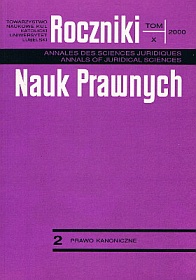Controversies Over Imposing a Tax on the Incomes of Church Corporate Bodies in the Years 1945-1989
Abstract
The article is concerned with the problem of imposing a tax on the Roman-Catholic Church in the period between the end of World War II and the regulation of the State-Church relations in 1989. The subject of the paper is focused on some chosen controversial issues connected with the income tax from the Church corporate bodies:
firstly, with the catalogue of subjects (tax-payers) that may avail themselves of tax exemptions;
secondly, with the kind of expenses treated as ones designed for the statutory aims of these bodies;
thirdly, with the kind of expenses considered as costs of functioning of the Church corporate bodies and of other, separately treated Church subjects;
fourthly, with the level and mode of the state's control over the Church’s work, its property and incomes. This was reflected especially in the duty to hold inventory books for the state authorities, duty that was questioned by the Church: also in the duty to hold accountant books, even when Church subjects did not have the tax duty as far as the turnover and income tax were concerned.
The author presents such a way of treating the income problems within the discussed range that resulted not so much from the holding decrees or tax laws, as from interpretation of generally used regulations with respect to the Church.
Copyright (c) 2000 Roczniki Nauk Prawnych

This work is licensed under a Creative Commons Attribution-NonCommercial-NoDerivatives 4.0 International License.


